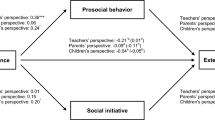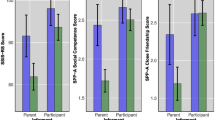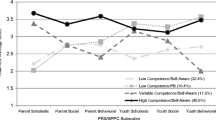Abstract
Preadolescent emotionally disturbed, learning-disabled, and normal boys were compared on social perspective-taking and behavioral measures to examine possible contributions of social cognitive deficits to children's adjustment problems. Antisocial-prosocial and withdrawn-gregarious behavior dimensions were studied through subscales derived from teacher ratings. Results indicated that across all groups, high perspective-taking was associated with significantly less withdrawal than was low perspective-taking; within groups, this finding was significant only for the emotionally disturbed boys. Contrary to theoretical assumptions, antisocial behavior was not significantly related to perspective-taking across the sample. Among emotionally disturbed boys, relatively higher affective perspectivetaking was significantly correlated with higher antisocial behavior. This positive correlation for the emotionally disturbed group was significantly different from the nonsignificant negative correlation between antisocial behavior and perspective-taking among normals. Findings for learning-disabled boys were intermediate. between results for emotionally disturbed and normal boys on both perspectivetaking and behavioral measures, and the learning-disabled group generally did not differ significantly from either other group. Theoretical and clinical implications of the findings are discussed
Similar content being viewed by others
Reference notes
Silvern, L. E.Social cognitive development and adjustment: No one-to-one relationship. Paper presented at the meeting of the Western Psychological Association, Los Angeles, April 1976. (Available from the author, Psychology Department, University of Colorado, Boulder, Colorado 80309).
Feshbach, N. D.Some interpersonal factors associated with successful and problem readers. Paper presented at the meeting of the Society for Research in Child Development, Denver, April 1975.
References
Achenbach, T. M. The classification of children's psychiatric symptoms: A factor analytic study.Psychological Monographs, 1966,80(1, Whole No. 615).
Achenbach, T. M. Psychopathology of childhood: Research problems and issues.Journal of Consulting and Clinical Psychology, 1978,46(4), 759–776.
Baldwin, J. M.Social and ethical interpretations in mental development. New York: Macmillan, 1906.
Bentzen, F. X. Sex ratios in learning and behavior disorders.American Journal of Orthopsychiatry, 1963,33, 92–98.
Bledsoe, J. C. Sex differences in mental health analysis scores of elementary pupils.Journal of Consulting Psychology, 1961,25(4), 364–365.
Bryan, T. Peer popularity of learning disabled children.Journal of Learning Disabilities, 1974,7, 261–268.
Budreck, F. J. A comparison of social perception of learning disabled children (Doctoral dissertation, Southern Illinois University, 1975).Dissertation Abstracts International, 1976,36, 7942A-7943A. (University Microfilms No. 76-13, 226)
Burka, A. A., & Glenwick, D. S. Egocentrism and classroom adjustment.Journal of Abnormal Child Psychology, 1978,6, 61–70.
Chandler, M. J. Egocentrism and antisocial behavior: The assessment and training of social perspective-taking skills.Developmental Psychology, 1973,9, 326–332.
Chandler, M. J., Greenspan, S., & Barenboim, C. Assessment and training of role-taking and referential communication skills in institutionalized emotionally disturbed children.Developmental Psychology, 1974,10, 546–553.
Conners, C. K. Symptom patterns of hyperkinetic, neurotic, and normal children.Child Development, 1970,41, 667–682.
Deutsch, F. Observational and sociometric measures of peer popularity and their relationship to egocentric communication in female preschoolers.Developmental Psychology. 1974,10, 745–747.
Devries, R. The development of role-taking as reflected by behavior of bright, average, and retarded children in a social guessing game.Child Development, 1970,41, 759–770.
Eme, R. F. Sex differences in childhood psychopathology: A review.Psychological Bulletin, 1979,86, 574–593.
Emery, E. J. Social perception processes in normal and learning disabled children (Doctoral dissertation, New York University, 1975).Dissertation Abstracts International, 1975,36, 1942B-1943B. (University Microfilms No. 75-21, 144)
Ferguson, L. R., Partyka, L. B., & Lester, B. M. Patterns of parent perception differentiating clinic from non-clinic children.Journal of Abnormal Child Psychology, 1974,2, 169–181.
Flapan, D.Children's understanding of social interaction. New York: Teachers College Press, 1968.
Flavell, J. H., Botkin, P. T., Fry, C. L., Wright, J. W., & Jarvis, P. E.The development of role-taking and communication skills in children. New York: Wiley, 1968.
Freud, A.Normality and pathology in childhood: Assessment of development. New York: International Universities Press, 1965.
Hays, W. L.Statistic for psychologists. New York: Harper & Row, 1963.
Johnson, D. W. Affective perspective-taking and cooperative predisposition.Developmental Psychology, 1975,11, 869–870. (a)
Johnson, D. W. Cooperativeness and social perspective-taking.Journal of Personality and Social Psychology, 1975,31, 241–244. (b)
Kohlberg, L. Stage and sequence: a cognitive-developmental approach to socialization. In D. Goslin (Ed.),Handbook of Socialization Theory and Research. Chicago: Rand McNally, 1969.
Kohlberg, L., LaCrosse, J., & Ricks, D. The predictability of adult mental health from childhood behavior. In B. B. Wolman (Ed.),Manual of child psychopathology. New York: McGraw-Hill, 1972.
McCarthy, J., & Paraskevopoulos, J. Behavioral patterns of learning disabled, emotionally disturbed, and average childrenExceptional Children, 1969,36, 69–74.
Mischel, W. Toward a cognitive social learning re-conceptualization of personality.Psychological Review, 1973,80, 252–283.
Neale, J. M. Egocentrism in institutionalized and non-institutionalized children.Child Development, 1966,37, 97–101.
Nie, N. H., Hull, C. H., Jenkins, J. G., Steinbrenner, K., & Bent, D. H.Statistical package for the social sciences (2nd ed.). New York: McGraw-Hill, 1975.
Peterson, D. R. Behavior problems of middle childhood.Journal of Consulting Psychology, 1961,25, 205–209.
Rosen, B. M., Bahn, A. K., & Kramer, M. Demographic and diagnostic characteristics of psychiatric clinic outpatients in the U.S.A.American Journal of Orthopsychiatry, 1964,34, 455–468.
Rothenberg, B. B. Children's social sensitivity and the relationship to interpersonal competence, intrapersonal comfort, and intellectual level.Developmental Psychology, 1970,2, 335–350.
Rotter, J. B. Generalized expectancies for internal versus external control of reinforcement.Psychological Monographs, 1966,80(1, Whole No. 609).
Rubin, K. H. Relationships between egocentric communication and popularity among peers.Developmental Psychology, 1972,7, 364.
Rubin, K. H., & Schneider, F. W. The relationship between moral judgment, egocentrism, and altruistic behavior.Child Development, 1973,44, 661–665.
Selman, R. L. The relation of role-taking to the development of moral judgment in children.Child Development, 1971,42, 79–91.
Selman, R. L., & Byrne, D. F. A structural-developmental analysis of levels of role-taking in middle childhood.Child Development, 1974,45, 803–806.
Silvern, L. E., Waterman, J. M., Sobesky, W., & Ryan, V. L. Effects of a developmental model of perspective-taking training.Child Development, 1979,50, 243–246.
Spivack, G., Platt, J., & Shure, M.The problem-solving approach to adjustment. San Francisco: Jossey-Bass, 1976.
Zahn-Waxler, C., Radke-Yarrow, M., & Brady-Smith, J. Perspective-taking and prosocial behavior.Developmental Psychology, 1977,13, 87–88.
Author information
Authors and Affiliations
Additional information
The authors acknowledge the invaluable assistance and cooperation of many teachers and principals in Jefferson County School District in Colorado, especially Ms. Norma Sobesky, coordinator of the program for Significantly Impaired Emotionally and Behaviorally Disturbed Children, and Ms. Beth Young, coordinator of the program for Perceptual and Communicative Disorders.
Rights and permissions
About this article
Cite this article
Waterman, J.M., Sobesky, W.E., Silvern, L. et al. Social perspective-taking and adjustment in emotionally disturbed, learning-disabled, and normal children. J Abnorm Child Psychol 9, 133–148 (1981). https://doi.org/10.1007/BF00917863
Issue Date:
DOI: https://doi.org/10.1007/BF00917863




